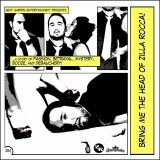The greatest #2: New Skin For The Old Ceremony
 I boil the teawater and dim the lights down to a cinematic dusk. I sit at my graffiti-coated desk in my underwear and clap away at my laptop keyboard. It's another insomniac Monday, and I'm situated halfway between the humming fridge and the fire escape. I'll be tearing into another chapter until the blue sky ambushes the black and the sun launches its daily sneak attack. I'll be making another effort at setting down words tonight in the hope that they'll resonate meaningfully with someone, anyone tomorrow. I can't write without music, so I slide back in my garage-sale chair and comb through my collection. I need something I can slip into like a winter bath. I need something that will aid my unwinding, complementing the pomegranate white tea and vanilla incense already circulating through my system. I need something infinitely rich, some bottomless, intricate, monastic, perfect poetry. Obviously, for this occasion and so many others (coffeehouse haunting, guzzling bordeaux alone, taking in the panorama spilling past train windows), I need the heart-riving medicine of Leonard Cohen. There's no doubt I've listened to New Skin For The Old Ceremony more than any other album in existence; just the tally for all these early-morning accompaniments is pretty tremendous. But with every return trip I make, the album proves to be newly generous. It reveals just enough of its secrets to welcome me in again, while still keeping its residual mysteries intact. Cohen's sullen baritone crests over a folky guitar. He pours out the contents of his black-clad soul in soft, precise quatrains. The everyday detritus of relationships becomes profound and sacred under his command. The untenable push-and-pull of human contact becomes high art. On "There Is A War," for instance, he masterfully details the thin line between affection and affliction: "Well, I live here with a woman and a child,/ the situation makes me kind of nervous./ Yes, I rise up from her arms, she says, "I guess you call this love";/ I call it service." And on "Field Commander Cohen," he underlines that same tenuous line with "I know you need your sleep now,/ I know your life's been hard./ But many men are falling,/ Where you promised to stand guard." Again and again the treatments of love and war (and their conflation) yield amazing results, naturally allying with another one of my all-time favorite albums, Elvis Costello's Armed Forces. Cohen is clearly fascinated by both of these old ceremonies and the constant need for new skin they demand. As he posits among the lines of "Lover Lover Lover," bodies can be used either as weapons "or to make some woman smile." Glancing at the royal seraphim on the album's cover gives a clear clue to Cohen's preference, as does the bulk of his eloquently presented desires. Even as he broaches the political and militaristic, he does so largely through the lens of the sexual and artistic. He's aware of the warfare going on around the world, but Cohen is more suited to being a soldier of beauty on a battlefield of sour notes and blank pages. It's still staggering to consider just how much inspiration I've wrung out of these well-traveled thirty-seven minutes of music. It's remarkable to realize that I can only think of New Skin For The Old Ceremony when I again watch the night retreat and the dawn invading. Nothing else can possibly score that imperceptible shift of hours and moods, my eventual surrender onto a flimsy mattress, the concession that another night is gone and I can't claim all that much progress. But there's always tomorrow, that untouched territory to advance toward, where I can once again become another enlistee in the army of art, another lover buoyed by his hero to fight the good fight. * MP3: "Field Commander Cohen" - Leonard Cohen from New Skin For The Old Ceremony * MP3: "There Is A War" - Leonard Cohen from New Skin For The Old Ceremony [Buy it] |





















Comments on "The greatest #2: New Skin For The Old Ceremony"
-
 Anonymous said ... (9:02 AM) :
Anonymous said ... (9:02 AM) :
-
 a custom written essay said ... (4:33 AM) :
a custom written essay said ... (4:33 AM) :
post a commentJust great winter skin products! Be beautiful the whole year!
You know Cohen said it was an indiscretion for which I'm very sorry, and if there is some way of apologising to the ghost, I want to apologise now, for having committed that indiscretion.